Trying to Understand OWS
Pondering Tea Party comparisons as well as the "does it matter?" question.
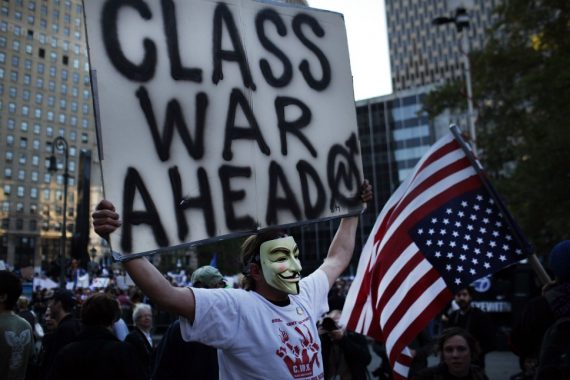 Sidney Tarrow (an expert on social movements*) writes for Foreign Affairs online as to Why Occupy Wall Street is Not the Tea Party of the Left.
Sidney Tarrow (an expert on social movements*) writes for Foreign Affairs online as to Why Occupy Wall Street is Not the Tea Party of the Left.
Specifically he describes the Occupy Wall Street Movement as follows:
Charles Tilly, the late Columbia sociologist, divided movements into three types, based on the policies they demand, the constituencies they claim to represent, and the identities they are trying to construct. Both the civil rights movement and the Tea Party combined the first and second goals. Occupy Wall Street is what we might call a “we are here” movement. Asking its activists what they want, as some pundits have demanded, is beside the point. Participants are neither disillusioned Obama supporters, nor or a “mob,” as House Majority Leader Eric Cantor cynically described them. By their presence, they are saying only, “Recognize us!”
[…]
Periodically, thousands of Americans from no single social class or region, and with no explicit goal, come together in what the Cornell political theorist Jason Frank has called a “constituent moment.” Likewise, the Yale constitutional theorist Bruce Ackerman names three such moments in American history. The most recent was during the Great Depression, when hardship and outrage came together in a wave of strikes and demonstrations, some of them far more mob-like than Occupy Wall Street. They had no specific policy agenda, but they demanded recognition and radical change in the relations between government, the people, and corporations.
[…]
“We are here” movements often flare up rapidly and fade away just as quickly, or disintegrate into rivulets of particular claims and interests. Others, like the new women’s movement, eventually coalesce into a few organized sectors, each with its own set of policy demands and political identities. It is too soon to tell which of these will be the fate of Occupy Wall Street. But one thing is certain: we are hearing a wake-up call to a complacent corporate sector and its Washington enablers, signaling that there is a new force demanding change at the grassroots of American society.
All of this gets to the question, which has been raised on several occasion here at OTB, as to whether this movement matters. The political scientist’s answer (as opposed to the pundit’s) is a rather unsatisfying: we don’t know yet.
The Tea Party ultimately mattered because it had electoral significance both in terms of winning (there is a key Tea Party faction in the House GOP caucus, and to a lesser degree in the Senate) and losing (had it not been for the Tea Party’s influence in CT, the Republicans would have picked up that seat). It seems unlikely that OWS will matter in that regard.
However, while it is impossible to know for sure if this movement (which has spawned, it should not be forgotten, spin-offs nationally and globally) matters or not, we can reasonably consider some possible ways that they might and I think that Tarrow’s classification of this as a “we are here” movement is where such discussion should focus.
If these movements, coupled with the general economic difficulties we are having, spurs a national conversation about things like wage stagnation, the lack of growth of the middle class, and the growing gap between the extremely wealthy and the rest of the society, then this could be a movement of significance. The prevailing attitude in the United States remains that everyone has a high degree of social mobility if they simply work really hard. However, the numbers don’t actually bear out that reality. If the attitudes of the general population come in line with the actual numbers, then a serious shift in politics could take place. I am not, by the way, talking about radical shifts, but rather a revival of a truly left-liberal politics.
(I know, btw, that many regular commenters on this site think that we are already in a left-liberal era, but I would submit that anyone who thinks this does not understand what these terms mean. To wit: the PPACA–the height of socialism of late in American politics according to some– is not a left-liberal program, it is a center-right program. Just ask Mitt Romney or the Heritage Foundation back in the 1990s in a moment of candor).
There is already a burgeoning conversation about the relative influence of large corporations and the extremely wealthy within the government.
I think, by the way, that even right-libertarians have reason to be motivated to think about these issues, as if one is truly a devotee of free markets, then one has real reasons not to like a lot of what has been happening over the last several years concerning government policies towards corporations (and, indeed, many libertarians have complained about issues such as TARP, the GM bailout, and “too big to fail”). While it is easy to make fun of OWS for being a bunch iPhone totin’ anti-corporation types, the bottom line appears to be that the movement is not as much anti-corporation/business as it is angry at the financial sector. Quite honestly, there are reasons to be angry at the financial sector.
All of these also has relevance to actual legislation in terms of regulation.
It also dovetails with the student loan issue. The loan issue becomes all the more salient in the moment because of the various bail-outs of the financial sector. It is not illegitimate for a kid who was told to go to school, even if it meant coming out the other end of the process with debt, to graduate with no job and wonder why Citigroup and such were helped out by the taxpayers for their poor decisions, while he is being told that he didn’t work hard enough.
All of this (and the economic crisis in general) hits directly on questions such as the power of large financial corporations versus the power of individuals and the degree to which the government is looking out for the former and not the latter. It, therefore, does get to social and economic policy issues that are not inconsequential.
As usual, by the way, all of this bring us to question of taxation and social policy.
A parting thought: as the Republican Party appears to be going further right of late, it stands to reason that there would be some sort of reaction from the leftward regions of our politics. Consider a simple fact: in the midst of ongoing economic difficulty, the main argument of the GOP has been that we need to cut taxes and cut spending. Such tax cuts would help those who are already doing quite well (and would certainly benefit the aforementioned financial industry). Further, spending cuts equals less services and a less complete safety net to the less economically fortunate in the society.
In short: those who helped cause the economic crisis are seen as benefiting from the current structure of politics, while those who are the most effected by it (and who feel like they played by the rules) feel alienated by the current structure of politics (and to be sure, the exact concerns of any particular participant in OWS may be quite varied).
Is there is any wonder that there are segments of the society which are upset?
This is more, therefore, than just a bunch of 21st century hippies to be dismissed. Granted, whether OWS brings serious political attention there issues (by getting people to think actively about them) remains to be seen.
—-
*He is the Emeritus Maxwell M. Upson Professor of Government at Cornell University. His book on this general subject area include Power in Movement (Cambridge, 1994, 1998), Dynamics of Contention (with Doug McAdam and Charles Tilly, Cambridge, 2001), Contentious Europeans (with Doug Imig, Rowman and Littlefield 2001), Transnational Protest and Global Activism (with Donatella della Porta, Rowman and Littlefield 2004), The New Transnational Activism (Cambridge 2005) and Contentious Politics (with Charles Tilly, Paradigm, 2006). See more here.

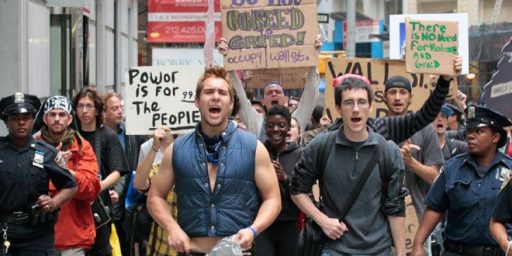
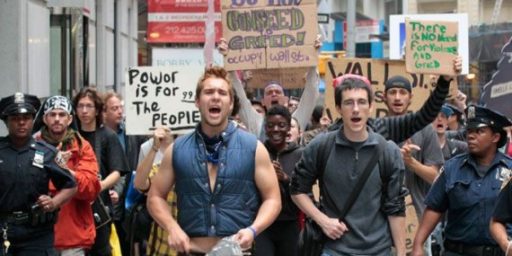
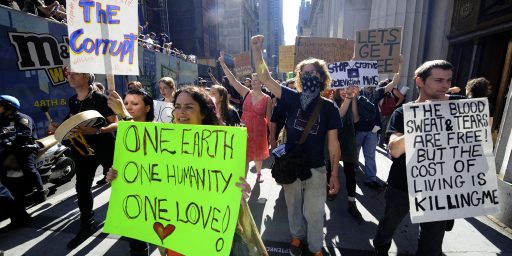
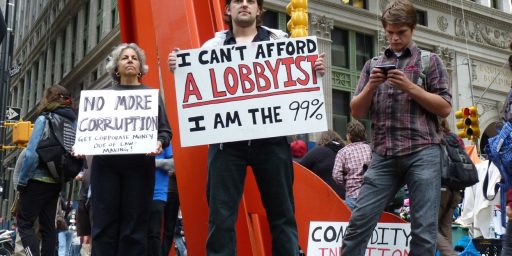

Steven,
A couple of questions:
.
Is this the first shot across the bow of our defacto upper class?
Could you see this movement trending towards violence if true action isn’t taken to remedy the inequalities?
———
By the way, great post, excellent analysis with a very good laying out of timeline and context. We can only hope some of your fellow OTBers were as diligent in there posts.
Yes, great post. Analysis rather than propaganda.
Ditto what Micheal Reynolds wrote.
I would add that you are right, Steven, to point out that the protesters are angry at finance not at business or corportions as is too often said. After all the movement is called Occupy Wall Street. Not occupy Detroit or Occupy Silicon Valley.
I think there’s a good chance that the OWS camps are the prelude to actual Hoovervilles — as a society we’re not creating the opportunities for young people to enter the middle class, and we’re making it much harder for people to stay middle class.
These are kids who grew up middle class, who did everything they were supposed to do, and have found that they’re going to have to settle for a lower standard of living than they grew up with. These are parents seeing that their children won’t live a better life than they have. These are middle-aged folks who have discovered that they really were one paycheck away from disaster.
You can harp on personal responsibility all you want, but if the opportunities aren’t there, it doesn’t do any good. One job for every five unemployed people is not good enough, and that’s not even looking at the quality of the job.
Either a prelude to Hoovervilles, or a prelude to an angry mob with iPhones, torches and pitchforks.
Also, great post.
On student loans, if the government didn’t back them then many of the banks would never have given them in the first place. If the students are against that then they are saying they are against student loans. Once again it sounds like they not thinking through what they are saying.
The difference between analyst and propaganda piece in most cases, perspective and bias. If you agree with the piece it is a good analyst. If not it is propaganda.
Could be.
But more likely from a historic perspective, OWS is likely the prelude to mass boycotts against U.S. companies that OWS perceives as behaving badly.
Goldman Sachs just announced a big quarterly loss and layoffs:
http://dealbook.nytimes.com/2011/10/18/goldman-sachs-reports-428-million-loss/
OWS’s first victory?
@Wayne: “On student loans, if the government didn’t back them then many of the banks would never have given them in the first place. If the students are against that then they are saying they are against student loans.”
Wayne, do you see that thing waaaaay out there in the distance. It’s the point and you might want to get a little closer to it. Let me restate it so you’ll recognize when it’s getting near. We’re talking about young people who have been told by everyone that the key to their future was getting an education. Liberals said it. Conservatives said it. Democrats said it. Republicans said it. Their teachers said it. The TV said it. EVERYBODY told these kids that they had to get an education in order to secure their economic future. So they did what everyone told them to do, only to find they now have huge debts and still no job prospects. Those kids did what they were supposed to do. They met their end of the deal. They’re angry that what they were explicitly promised has now been flushed down the toilet.
Mike
ponce,
“OWS’s first victory? ”
Or Goldman Sachs using financial accounting tricks (including claiming about $2.5 billion in trading losses — not sure how much of them they needed to take this quarter) to suggest OWS’s agenda is misguided?
@Wayne:
I helped organize, and spoke to, a local Occupy event here in Orange County, CA over the weekend.
What I told them was this:
“I am old enough to remember a time when there was virtually no such thing as student loan debt; when I was young, college was much cheaper, heavily funded by tax dollars; and students were given generous grants to pay what little tuition there was. Community colleges were free to anyone who walked in; UCLA was where plumbers and mechanics sent their children; Hell, if you were a veteran, you were given nearly a free education courtesy a grateful public.
Today we are told that is impossible, that we “don’t have the money”;
That is a lie;
What you are not being told is that we don’t have the money after paying a Trillion dollars to fund pointless wars, another Trillion to bail out irresponsible Wall Street gamblers, and another Trillion in tax giveaways to the 1%.
What you are being told is that education is a luxury reserved only for the very few, that it is a consumer trinket like a sports car, something that you only deserve if you can afford it.
That is a lie;
What they are not telling you is that education benefits all of society, and should be paid for by all of society.
The same conservatives who endlessly preach to you about personal responsibility were the very same generation who received the greatest benefit from the government that they now attack.
Providing education to our children used to be a priority for America; today it isn’t. It can be again, if you rise up and protest and fight for it.”
@Liberty60:
Excellent comments Liberty60. Would you mind if I shared it with others?
Steven
Thanks for making this distinction. Claiming OWS is broadly anti-business (or anti-market) is like claiming I am anti-baseball, because I think steroids are a scourge and umpires are a necessary element of the game.
I will say that I think it goes beyond the financial sector to any corporations that are gaming the system. I’d love to see the defense industry get pulled into scope at some point, though I can’t say I’ve seen that yet.
I started college in the mid 90s (late start, I was 35 at the time) I was shocked at what a large presence banks had on campus. Outside of student orientations banks would have booths set up where you could apply for credit cards. Buy a Cal Bears notebook, and there would be a credit card application in it.
It is very obvious that banks have college kids pegged as easy targets. Give them easy access to credit and let them pile up the debt as they go through school.
It boils down to irresponsibility, greed, and opportunism.
Irresponsibility – Those who can are taking all they can as quickly as they can, perhaps because even they, deep down, know that things cannot stay as they are now.
Irresponsibility, Greed – Wealth used to be more than just amassing dollars – where social class and responsibility were as much a part of “upper class-ness” as money – it was always first, but never the sole definition of wealth.
It was one thing to be rich, but (and I know it was a different time) but large business owners gave back – Carnegie, Mellon, Morgan, Rockefeller, et al were ruthless bastards, yes but they built museums and cities and universities – it was a social expectation than filtered down. Even middle class had it – the bourgeoisie always had pretensions but they served a purpose. (if nothing else that for creating generations of bad gray flannel suit novels).
Hell, Michael Reynolds you are a writer, it’s easy to see – I’m reading Nancy Drew with my 7 year old daughter – and the expectations that were incumbent on people of “wealth” or “of a class” are vastly different – and admittedly – that’s positive in many ways, but it’s also created a sensibility that takes and takes and does not give back – and is not penalized for it.
Irresponsibility, Greed, and Opportunism – after decades of relatively easy money and social mobility through the late 70s 80s and 90s a lot of people got lazy – and we experienced great social change at the same time, so lots of the old status quo got upended – again in and of itself, that’s not bad, but the baby kinda got tossed with the bathwater, and now that things are getting tight, everyone is scrambling for their last bite – and feeling entitled to do so, and being given the opportunity to do so, and playing by the rules seems like a suckers move.
This is a way over simplification, obviously, but it’s a take on the situation.
It’s funny – lots of people complain that the TP and the right only want to go to an idealized idea of the past – and they are actively working against the very things necessary to get there
But for me it’s not an idealized past we need to get to, just a reconnection to core moral and ethical responsibilities, or at least to a point where people start to see a tangible benefit in working to better things for the community and the country.
Considering that this guy starts off with a lie, I’ll file the rest of his writing in the trashcan: “Both the civil rights movement and the Tea Party [4] were created to serve specific constituencies — in the first case, African Americans suffering under the burden of Jim Crow in the South; in the second, older, white middle-class Americans who saw themselves as victims of an overweening federal government. ”
The Tea Party was created by corporate astroturfers, and exploded juuuuuuuuuuuuust as the opposing party occupied the White House. Apparently they held their tempers in until a most convenient moment.
@Barry: Well, there is a rather fundamental difference between a lie and disagreeing with someone…
Still, if you reread the portion that you quoted, I think you may have more agreement with Tarrow’s assessment that you think. To wit: even if your hypothesis as to whom it was that created the TP is correct (an issue I will leave along for now), how does it contradict the constituency that Tarrow describes? You are making an assertion about who created the TP. Tarrow is making an assertion about who makes up the TP’s constituency.
His point, as I understand it, is that as a social movement, the TP has a fairly well defined constituency while OWS does not.
And, moreover, because the TP has a specific constituency, it is easier for it have pursued specific actions (like taking an anti-tax message to DC).
It was a very good post, but there was that tension between the “will it matter” lead-in and all the time you spent analyzing it.
I’d really like “it won’t matter” folk to say how you stuff the genie back into the bottle. Do you get the electorate to accept increasing unemployment combined with increasing income inequality? Do you convince them it’s fate?
Or do you just stall for an election cycle, pretending that austerity with tax cuts will reverse middle class decline?
I am reading through Edmund Morris’ excellent biography of Theodore Roosevelt, and am amazed at the similarities between the end of the Gilded Age politics and today.
Then as now, banks and corporations had amassed incredible fortunes and the entire economy was run by a tiny handful of financiers and railroad tycoons.
Then as now there were discussions of what role, if any, the government had to play in all this.
Imagine the lead on Politico or Fox News if the Kenyan Kommie were to say this:
“Great corporations exist only because they are created and safeguarded by our institutions. And it is our right and duty to see that they work in harmony with these institutions.”
Or THIS!
“Corporate cunning has developed faster than the laws of nation and state. Sooner or later unless there is a readjustment, there will come a riotous, murderous day of atonement.”
Theodore Roosevelt, 1903
@Wayne:
Some of them may understand all that. If they have a degree which does not secure a career, they may recognize that they’d have been better off with a different path.
@ liberty
Theodore Roosevelt was an America hating commie bastard.
@Liberty60:
Someone needs to chart California college enrollment (students) against GDP. I also went to a California State University when it was cheap (first semester tuition $96), but I think we still hadn’t gotten to “college for everyone.” Some graduates from my high school went to college, but many did not.
Here we are, when I graduated high school in the 70’s, college enrollment was about 50%, now it is about 70%.
I guess that isn’t the huge increase I thought it was … though I suppose we must ask if 70% is optimal.
Some possible drivers of education cost inflation that sound, off the top of my head, plausible:
1) increased enrollment w/o increase in supply;
2) increased opulence of accomodations and such;
3) increased administration & marketing costs that are passed on to students;
4) increased faculty and/or support staff wages (based on earlier discussions, this appears to be JP’s theory, or at least a central component);
5) subsidies, either direct or indirect (student loans);
6) those stupid college rankings, coupled with the idea that if you’re paying a ton of money you’re buying a good education, fer sure;
7) withdrawl of subsidies (obviously conflicts with #5) – possible that costs back in the day were higher than they appeared
I’m sure there’s more.
@Rob in CT: I might add-
8) other career opportunities that don’t depend on a college education (AKA union jobs)vanishing, leaving working class youths with no other option to enter the middle class but a for-profit college with its staggering debt.
@Wayne:
Am I safe in assuming you disagree with this piece, thus think it’s propaganda?
If so, in your world, this is propaganda:
And this is good analysis.:
Good analysis stems from objectivity, or at least an honest attempt at it. Propaganda stems from a belief in an argument and all of its assumptions without ever testing them, it consists of cherry picking and ignoring opposing evidence. Good analysis looks for answers. Propaganda tries to convince it has the answers.
@anjin-san:
Anjin, when I was at Cal, long before you, a student couldn’t get a credit card to save his life and tuition was $750 a year (yes, a year).
Eventually, the banks saw an opportunity to sink their hooks in people when they were young and they also saw them as a good credit risk because these kids were the ones who were going to get good jobs after they graduated.
Funny how that all worked out.
My grandfather send both his kids to Cal while he was working at a laundry. He came from poverty in the old country that was so bad 5 of his siblings did not live to become adults. Going to Cal put his kids on a road that got our family into the upper middle class. We went from the coal mines to the country club.
My grandfather would have tears in his eyes when he talked about what a great country this is.
Naturally the right wants to put and end to nonsense like that.
You think tuition at CA state schools isn’t $750 because of ‘the right’? The stupidity of that is mind boggling.
These are hard to understand
http://www.komonews.com/news/local/132064518.html
http://cleveland.cbslocal.com/2011/10/18/occupy-cleveland-protester-alleges-she-was-raped/
http://emorywheel.com/detail.php?n=30249
While the numbers seem to be growing, mainly through copycat groups, the actual numbers in this, ah, movement, are rather pitiful to say the least. That the majority of the participants are of the leftist ilk wanting forgiveness for their bad financial decisions and lots of freebees from the government, including free college, is quite obvious. Their rather eclectic set of complaints argues for a deadly lack of focus, highly impaired logic, lack of responsibility, and merely feel good actions. The 80% that are said to have a job will probably be unemployed or they will soon desert the crowd.
Personal economics will stifle this group real soon now, unless the leftwing Soros and his buddies underwrite each individual with free soup and bread. The whole mess reminds me of the 60’s, but they are even more aimless, yet better dressed and outfitted with all the latest electronics gadgets, drums, and face paint. They are getting far more coverage than they deserve from the media, and act out in a loutish manner even then, mainly to attract attention. Are they children of the boomer generation recreating their father’s penchant for pointless and amoral demonstrations? The socialists and communists have decided that this is their time to join up, perhaps to capture the limelight, which sets the larger impacting tone quite admirably.
New York needs street cleaners running up and down Wall Street night and day.
And who’s to forget the rabid anti-Semitism
http://pajamasmedia.com/tatler/2011/10/19/spew-anti-semitism-at-occupy-rally-get-fired/